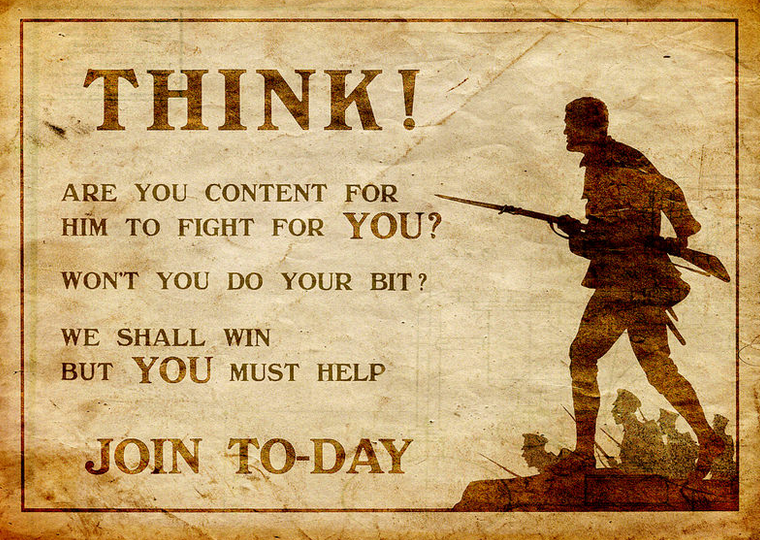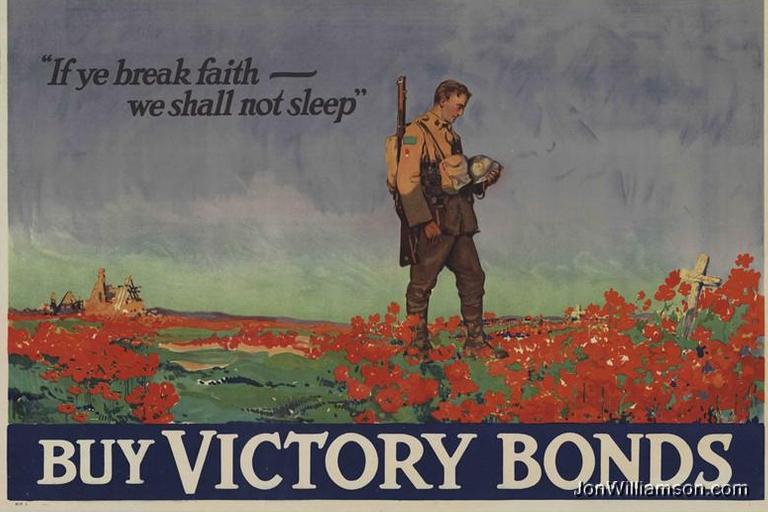
As a student of both history and media, applications of effective strategic communications has always fascinated me as the collective actions of social engineering a society has proven all to easy and useful for the political and economic elite of civilization. As such, the American propaganda machine during WW2 (1941 - 1945) is considered a strategic communication success in US foreign policy as well as the public diplomacy of Franklin D. Roosevelt. The propaganda campaign was a highly effective one being run by the Office of War Information or (OWI). The principle goal was to bolster support for the war effort through media which included paperback advertisement, radio broadcast, and movie animation.
The outcome centered on creating a unified method which would persuade the American people to unite behind a single cause which also included selling war bonds, improving moral, and deterring the isolationism. Strategic communication is defined as being a “coordinated action, message, images and other forms of signaling or engagement intended to inform, influence, or persuade selected audiences in support of national objectives" within the context of governmental communication” (Paul, 2011).
The first method employed by the government was that of paper back advertisement exhibited through posters and leaflets which contained either a powerful image with a phrase meant to impact the reader on an emotional level. The most famous of these propaganda posters arguably being the “We Can Do It” message with Rosie the riveter which elicited an increase of female workers in the factories in order to account for the lack of males in the work force. The second most prominent form of government influence utilized radio broadcast, in which the most famous example coming was President Roosevelt's speech after the bombings at Pearl Harbor, effectively appealing to, directly people’s sense of patriotism. The last major influence came with introduction of animation or cinema. During the war, a series of shorts both animated and live footage were shown during before and after a movie giving the audience there first glimpse into actual combat in an effort to sway emotions and influence mass perceptions of the enemy. This was a public affair move which had to coordinate with PSYOP in order to correctly influence the audience’s feelings towards the enemy (Paul, 2008).

It is important to note that an important element of Public Diplomacy is state leaders directly and indirectly influencing the masses and can be historically demonstrated by the lend lease act which was heavily pushed by FDR to promote the defense of the United States. The campaign was considered a great success allowing the US industrial might to produce and raise massive amounts of funds giving the US the keys to victory in both theaters of war. Interestingly, the lend lease program was neither beneficent in nature nor aimed at the people of the world. It was a legal dodge to legally maintain neutrality playing to the domestic U.S. while also telegraphing to world leaders where the U.S. was headed. It also gained a tremendous number of concessions that continue to benefit the United States to this day. For example, U.S. leaders demanded access to British technical secrets like the magneto and radar that would prove invaluable in the war effort. It also gained access to British military bases, some of which we continue to use today.
When this campaign was created there was an extensive use of derogatory racist and belittling messages aimed at the Japanese, Germans and the Italians. Nevertheless, The racist undertones of propaganda beginning with the First World War and extending and enhanced in the second was widely popular on both sides. The United States could counter the propaganda of the Nazi regime and specifically Japan through their political cartoons. Propaganda during WWII helped to unite the nation against the tremendous adversaries that it was facing. “WWII propaganda at home and abroad — call it the art of persuasion or psychological warfare — was surely part of the effort on all sides (Kelly, 2013).” The propaganda set out by all sides, be it the Japanese, the British and the Germans, was some of the best and most effective to date. The U.S. utilized not only posters but also comics, movies, radio, and leaflets. “After the Japanese attack on Pearl Harbor, U.S. citizens cried out for vengeance and rallied support through media forms such as propaganda posters (Miles, 2012).
The racial undertones were vital to creating the "us versus them" mentality. This has several benefits from a total war perspective. First, if your enemy is no longer perfectly human, it is easier to slaughter them. Second, absurd caricatures of the other minimize the minor differences between the poor, rural Kentuckian and the wealthy, New York elite. It solidifies the team. Calling back to last week’s reading, Cialdini writes that compliance is easier to achieve if people see themselves on the same team (2009, p. 157). This principle played a large factor in the personal sacrifices and drastic social changes of the ordinary citizen: rations, saving cooking grease, the draft, and female workers.
References:
Cialdini, Robert. Influence Science and Practice. Boston, MA: Pearson.
Kelly, Michael. "The Art of War WWII vet says Japanese propaganda mostly backfired." Omaha.com. July 04, 2013.
Miles, Hannah. "WWII Propaganda: The Influence of Racism – Artifacts Journal University of Missouri." Artifacts Journal RSS. March 2002.
Paul, Christopher, (2008). Information Operations: Doctrine and Practice. Westport, CT: Praeger.
Paul, Christopher, (2011). Strategic Communication. Westport, CT: Praeger.
Image Credit: AK Rockefeller - Think
Image Credit: Jon Williamson - Vintage Poster Art
This good history.👍👍
Nice post, i like it
WARNING - The message you received from @tripadvisor.com is a CONFIRMED SCAM! DO NOT FOLLOW the instruction in the memo! For more information, read this post: https://steemit.com/steemit/@arcange/scammer-reported-tripadvisor-com